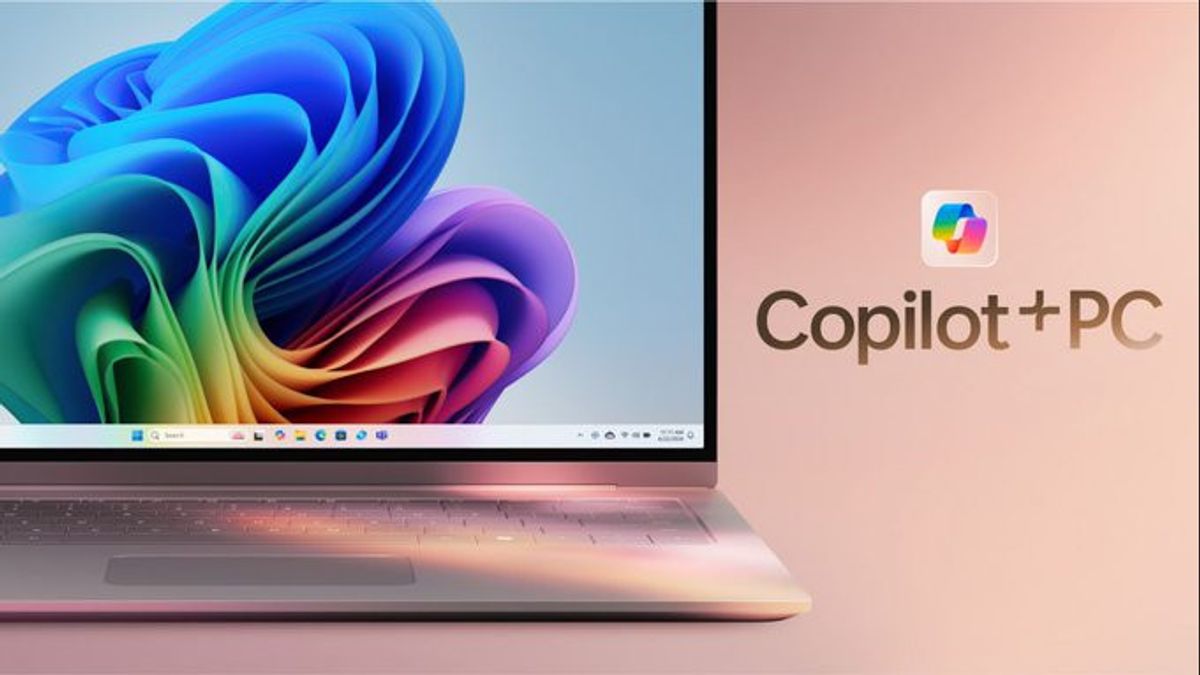JAKARTA - On Monday, May 20, Microsoft launched a new category of personal computers (PC) with artificial intelligence (AI) features as an effort to integrate this fast-growing technology into its products and compete with Alphabet and Apple.
At an event on campus in Redmond, Washington, Microsoft CEO Satya Nadella introduced what Microsoft calls PC "Copilot+", which Microsoft and various manufacturers including Asustek Computer will sell.
Microsoft launched these laptops as its shares are trading near record highs after a Wall Street rally driven by expectations that AI will drive strong gain growth for the company and its main competitors in technology. Able to handle more AI tasks without having to use a cloud data center, the new computer will be sold starting at $1.000 and starting on June 18.
The ability to process AI data directly on the computer allows Copilot+ to have a feature called "Recall." "Recall" tracks everything done on the computer, from web browsing to voice chat, creating a history stored on a computer that users can search for when they need to remember something they did, even months later.
The company also demonstrates Copilot's voice assistant acting as a real-time virtual coach for users playing video games "Minecraft." Yusuf Mehdi, Microsoft's chief consumer marketing chief, said the company expects 50 million AI PCs to be purchased in the coming year. At a press event, he said the faster AI assistant running directly on PC would be "the most exciting reason to update your PC in a long time."
Global PC shipments declined about 15% to 242 million last year, research firm Gartner said, suggesting that Microsoft expects this new category of computers to cover about a fifth of all sold PCs. "People just need to convince that the experience of this device itself justifies this new category of Copilot+ machines," said analyst Ben Bajarin of Creative Strategies.
Microsoft's new computer marketing category "Copilot+" highlighting the AI feature is reminiscent of the "Ultrabook" category of Windows thin laptops promoted by Intel with PC manufacturers in 2011 to compete with Apple's MacBook Air. Microsoft executives also say that the latest technology from OpenAI's ChatGPT, GPT-4o, will be "soon" available as part of the Copilot.
Microsoft also introduced a new generation of its Surface Pro tablet and Surface laptop equipped with Qualcomm chips based on Arm Holdings architecture. Microsoft also introduced a technology called Prism that will help the software written for Intel and AMD chips run on chips made with Arm technology.
SEE ALSO:
Microsoft shows its new device in action against Apple devices, showing photo editing software from Adobe running faster on Microsoft devices. Apple earlier this month showed a new AI-focused chip expected to be used in future laptops. After Intel's processor dominated the PC market for decades, Qualcomm and other low-power Arm components makers have tried to compete in the Windows PC market.
Qualcomm Snapdragon X Elite chips include a neural processing unit designed to accelerate AI-focused applications, such as Microsoft's Copilot software. Microsoft held this product event the day before their annual developer conference. Microsoft aims to extend its advantages in the race to generate AI tools to be paid by consumers. Its partnership with OpenAI allows it to overtake Alphabet in the race to dominate this field.
Last week, OpenAI and Alphabet's Google showed off AI technology that can respond via voice in real-time and can be interrupted, both of which are hallmarks of realistic voice conversations that have challenged AI voice assistants. Google also announced that it is launching several generative AI features to search engines in its favor.
Windows PC manufacturers have been under increasing pressure from Apple since the company launched a dedicated chip based on the design of Arm and left Intel processors. The processor designed by Apple has provided Mac computers with superior battery life and faster performance than competing chips.
Microsoft relies on Qualcomm to lead Windows operating systems to Arm chip designs in 2016. Qualcomm has an exclusivity in Microsoft Windows devices that will end this year. Other chipmakers like Nvidia have made efforts to create their own Arm-based PC chips.
The English, Chinese, Japanese, Arabic, and French versions are automatically generated by the AI. So there may still be inaccuracies in translating, please always see Indonesian as our main language. (system supported by DigitalSiber.id)


















